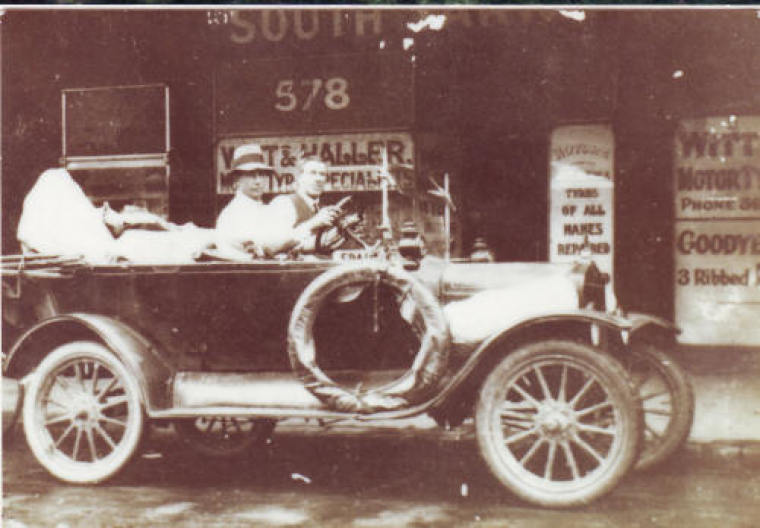
Sadly, he continues in this article, advertising campaigns are not effective. All the graphic messages on TV from Government advertising agencies, showing the dangers of motor vehicles, still do not convince many young people that they are likely to be in that dangerous position, that they see on the ads.
Perhaps a young driver finds that friends are without transport after a party in one of these rural areas. Perhaps he thinks the area is so isolated that the police will not be around. He offers several friends a lift home, regardless of the rule that he, as a 'provisional' driver, should take no more than one passenger late at night.
The drama of the occasion with these friends in the car all too often takes over, and their lack of experience makes him prone to go that one step too far with speed or showing-off.
Motor vehicle safely has greatly improved with seat belts, air bags, crumple bars and electronic warnings; but many of these young people are driving older model cars which were built before these things were invented. Moreover, even when a modern 'safe' car at high speed hits a stationary immobile object such as a large tree, little will save the occupants.
Recent changes in the law have been partially effective
In NSW, between 2005 and 2007, there was much discussion about increasing the restrictions on new drivers. The measures discussed included curfews, restrictions on distance-from-home new drivers could take the car, total ban on alcohol consumption, restrictions on passengers, ban on the use of mobile phones. The curfews and limits on distance were seen, after public conversations, to be too restrictive and moreover to be unenforceable and impractical.
After all, some of these youngsters need the car to get to work or study, and sometimes that requires long daily commutes and after-hours driving – either within our sprawling Australian cities or in the country where Mark Tronson lives.
In the end, a two-stage system of very tight restrictions on speed and passenger numbers was introduced for the first year of 'probation', with lesser restrictions for a further two years. Probationer drivers need to display a 'P' plate so that other drivers, and the police, know there is an inexperienced driver.
At the same time, a log-book of experience was introduced for 'learner' drivers, who have to have a licensed driver as an instructor with them at all times. They now have to demonstrate 120 hrs driving, including 20 hrs at night.
Similar changes have been introduced in some of the other states since then, but each state has slightly different rules.
These measures are aimed to help the young driver have as much experience as possible before he or she gets their licence, without unnecessarily restricting their freedom because cars are an integral part of our social and work culture, as mentioned above.
The statistics given by the Roads and Marine Services department show that the number of crash fatalities involving young drivers decreased in 2008, after these rules were implemented. Pleasingly, the total number of holiday deaths in road accidents is falling in our society, anyway, year by year and is now much less than when Mark Tronson was a teenager.
Lateral thinking needed to find solutions
However, Mark Tronson says, we still need to improve the situation. Any unnecessary death on the road is a tragedy. He would be interested to hear of any innovative, but workable ideas.
One idea, attractive to the youngsters, is a blog site discussing the dangerous things that some provisional drivers platers have done. It is not a 'lecture', but news reports and discussion about real things that have happened to young people 'just like them' and it is sponsored by the newspaper, the 'Daily Telegraph'.
It also provides some discussion of how to avoid these issues, but more importantly, it brings home to youngsters that 'these things might happen to them' – they are not invulnerable. (www.dailytelegraph.com.au)
More recently the Government has been expressing ideas and legislation regarding truckies and the over-top time allotments they are given to get product to their destination. One such bereaved widow was highlighted in the Sydney Morning Herald. (www.smh.com.au)
Experience is always an issue
Another method of gaining experience quickly, that Mark Tronson has seen some of his young friends and parishioners do is to take a private 'advanced driver training' course, where they are taught to safely handle unexpected situations such as skids. Sometimes the not-so-young drivers take these courses too, often sponsored by their employers.
In the end, thinks Mark Tronson, while the young drivers are slowly gaining the experience they need to deal with the unexpected, parents can only help by having reasonable conversations with them and then hoping and praying that they are sensible. But older road users are becoming increasingly at risk. Deaths of road users aged 70 and over increased by 13 per cent and accounted for 15 per cent of all fatalities.
As with yesterday's Part 1 article he concludes with Proverbs 13:16, and make sure that our children and young friends have the knowledge they need to be safe, and that they will choose not to be foolish while driving the car. "Every prudent man worketh with knowledge: but a fool spreadeth out folly" (ERV)
Dr Mark Tronson is a Baptist minister (retired) who served as the Australian cricket team chaplain for 17 years (2000 ret) and established Life After Cricket in 2001. He was recognised by the Olympic Ministry Medal in 2009 presented by Carl Lewis Olympian of the Century. He has written 24 books, and enjoys writing. He is married to Delma, with four adult children and grand-children.
Mark Tronson's archive of articles can be viewed at www.pressserviceinternational.org/mark-tronson.html
